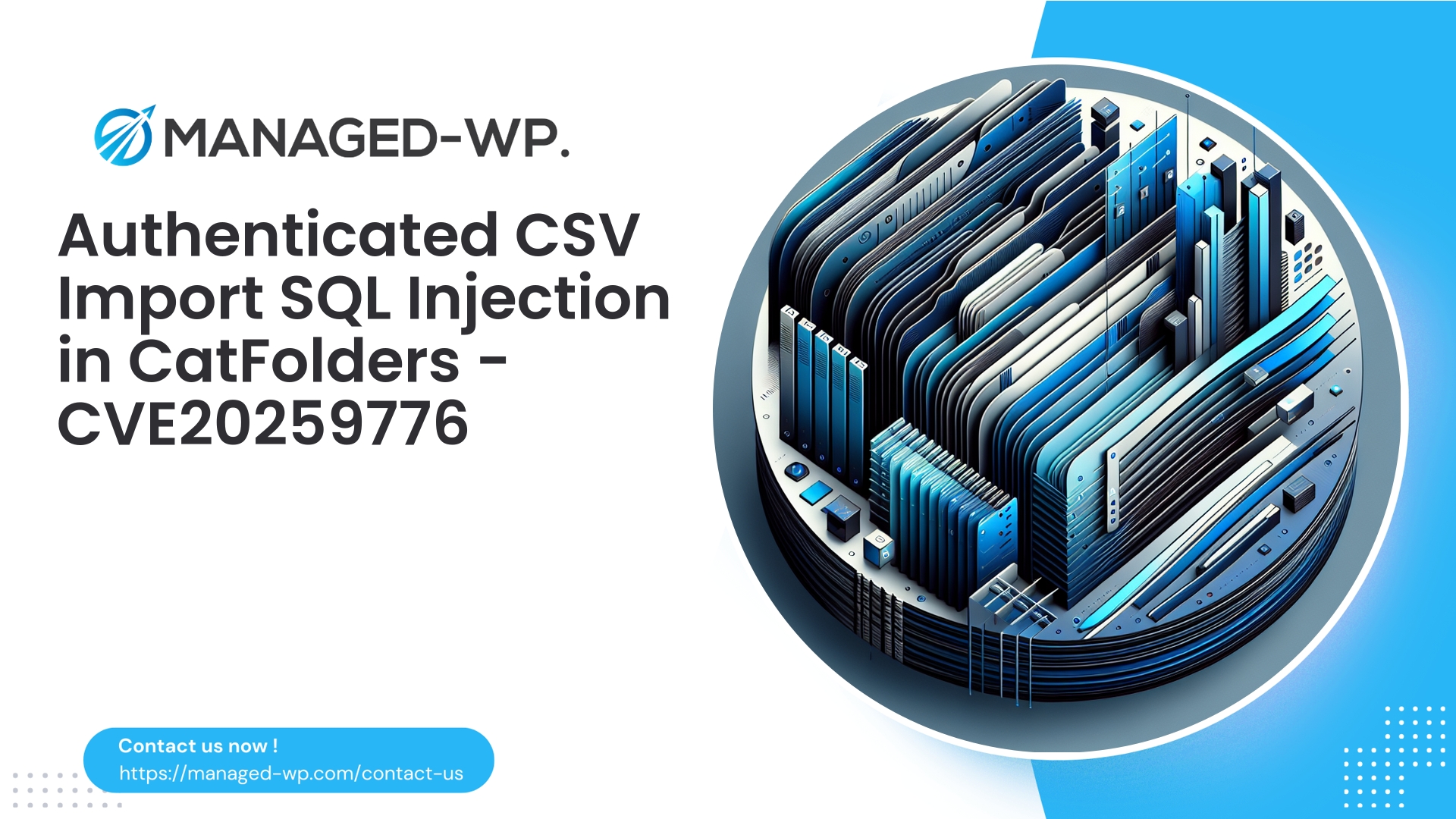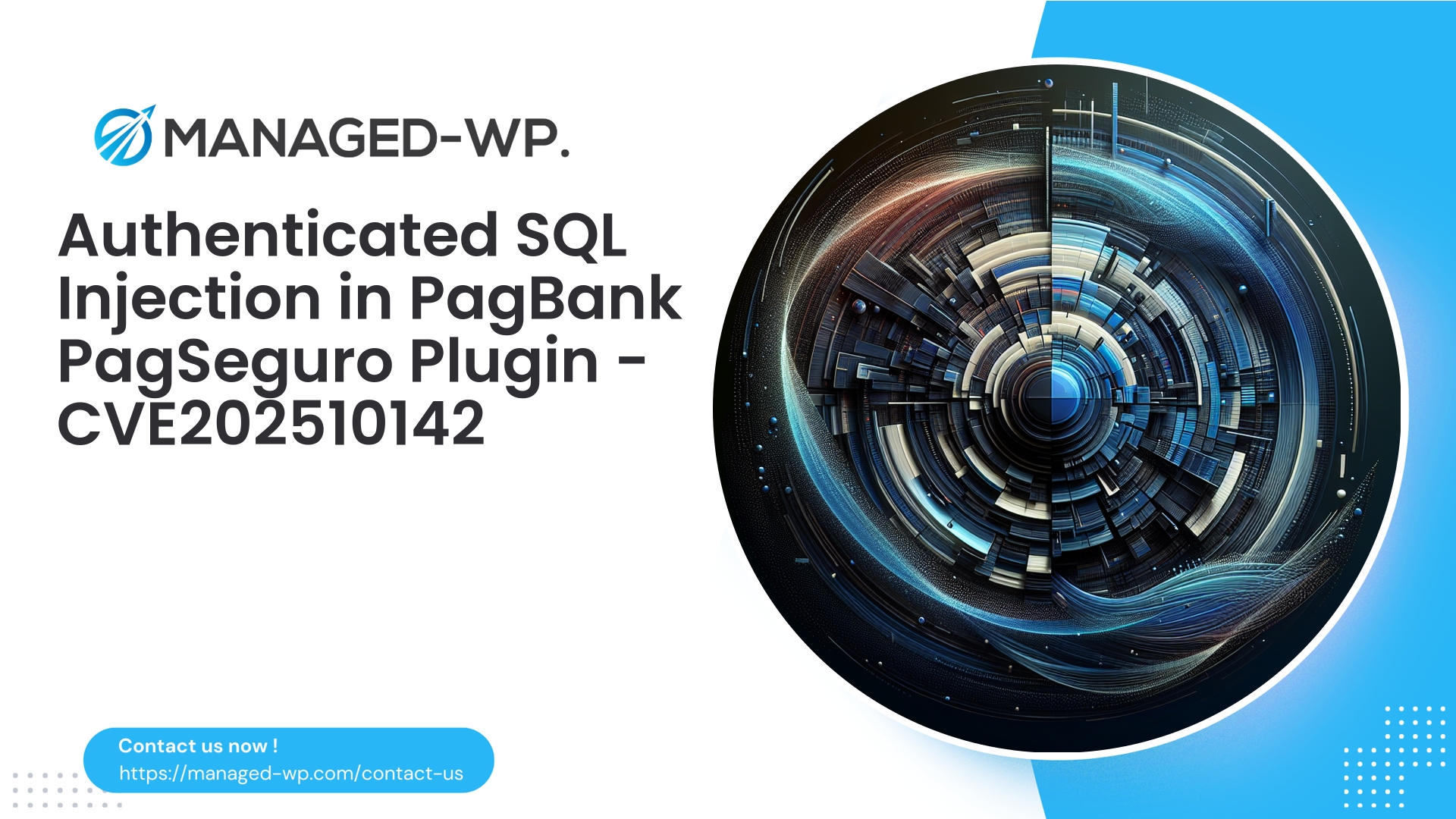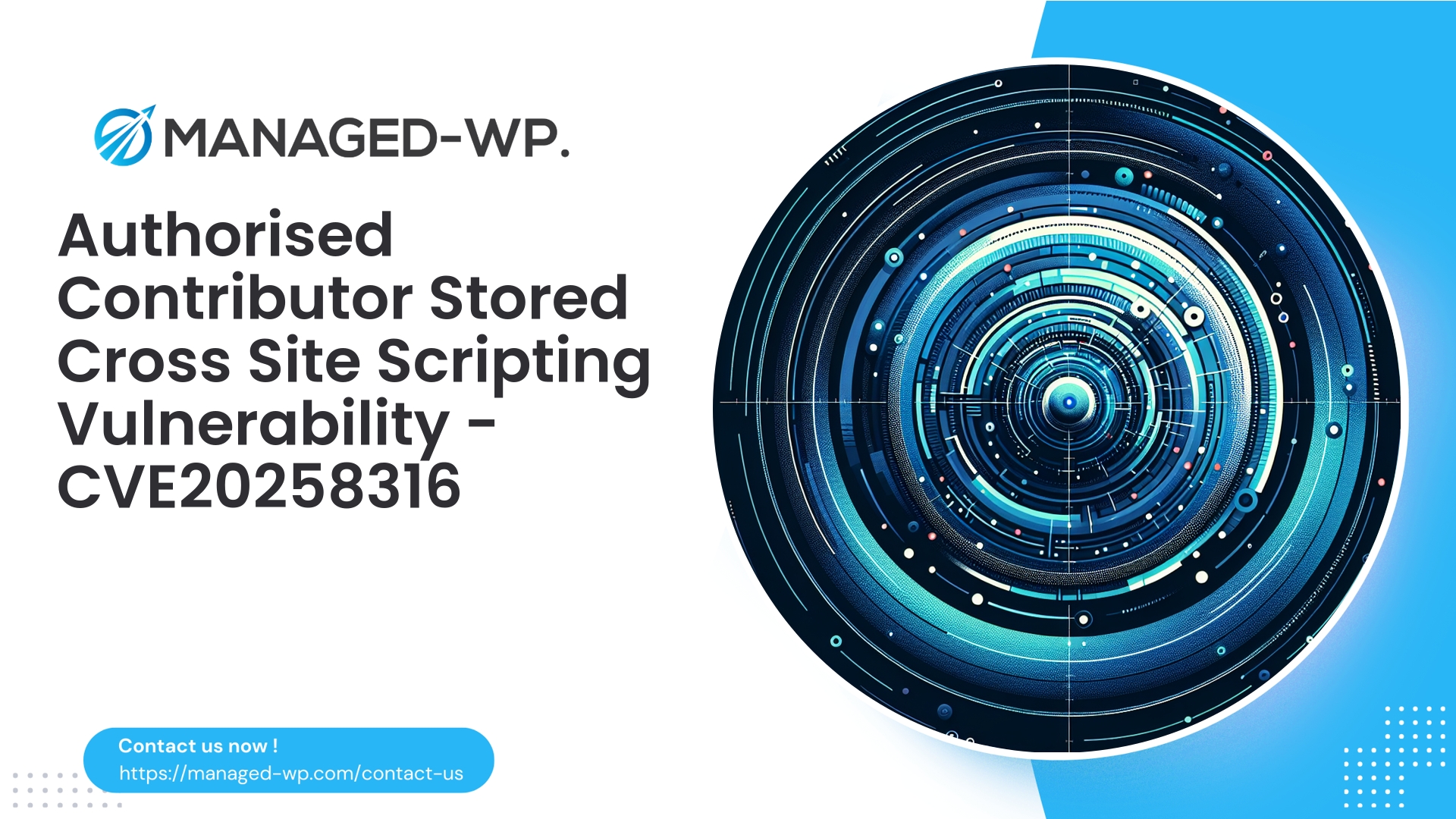| 插件名称 | 猫折叠器 |
|---|---|
| 漏洞类型 | SQL 注入 |
| CVE编号 | CVE-2025-9776 |
| 紧急 | 低的 |
| CVE 发布日期 | 2025-09-11 |
| 源网址 | CVE-2025-9776 |
CatFolders (≤ 2.5.2) — 通过 CSV 导入进行身份验证 (Author+) SQL 注入 (CVE-2025-9776)
作为一家总部位于美国的 WordPress 安全领先专家,Managed-WP 深知及时修补漏洞和深入理解漏洞的重要性——尤其对于那些允许已认证账户执行 SQL 注入的攻击途径而言。2025 年 9 月 11 日,CatFolders 插件(版本 2.5.2 及更早版本)的一个严重安全漏洞被公开披露,漏洞编号为 CVE-2025-9776。该漏洞允许拥有作者级别或更高权限的用户利用 CSV 导入功能注入恶意 SQL 命令。
本次简报将带您了解漏洞的本质、对实时 WordPress 安装的潜在攻击场景、实际影响分析、立即缓解策略,以及我们的 Managed-WP 服务和防火墙保护如何在您部署官方补丁的同时迅速降低您的风险。
TL;DR(概要)
- 漏洞: 针对 CSV 导入端点的已认证 SQL 注入攻击。
- 受影响的版本: CatFolders 插件 ≤ 2.5.2。
- 解决: 已在 2.5.3 版本中修复——请立即更新。
- 所需权限: 作者或以上级别(仅限已认证用户)。
- 风险等级: 高风险——如果与其他问题同时发生,可能导致数据泄露、数据库篡改或整个网站被攻破。
- 建议立即采取的行动: 更新插件,限制 CSV 导入访问权限,审核作者帐户,强制执行强密码策略,并实施针对导入向量的 WAF 保护。
- Managed-WP 建议: 利用我们提供的虚拟补丁和基于行为的 WAF 规则,在准备全面部署补丁的同时,立即降低风险。
为什么这种漏洞需要引起重视:已认证 SQL 注入的危险
SQL注入仍然是WordPress环境面临的最严重威胁之一。虽然未经身份验证的SQL注入通常会触发紧急警报,但经过身份验证的注入也绝不能低估:
- 许多 WordPress 网站维护多个作者或投稿人帐户;这里的凭据通常安全性较低,并且经常重复使用。
- 攻击者通过网络钓鱼活动、弱密码或辅助插件中的漏洞获得作者级访问权限。
- 拥有足够权限的恶意内部人员或承包商可能会蓄意发动攻击。
- SQL注入使攻击者能够枚举数据库内容、更改站点设置、插入后门或创建管理员帐户。
CSV 导入接口本身就增加了防御的复杂性,因为 CSV 上传绕过了某些传统的文件限制。再加上不恰当的数据清理和缺乏预处理的 SQL 语句,这就形成了一个极易受到攻击的漏洞。
技术概述
分析证实,CatFolders 插件的 CSV 导入方法未能正确清理 CSV 数据,导致数据无法直接导入 SQL 查询。具体而言:
- 导入端点接受具有作者权限或更高权限的用户提交的 CSV 文件。
- CSV 数据字段直接插入到 SQL 语句中,而没有进行足够的参数化或转义。
- 恶意构造的 CSV 内容可以嵌入 SQL 有效载荷,从而导致注入攻击。
- 由于利用该漏洞需要具有作者权限的已认证用户,因此其影响范围有限,但对于多作者设置而言仍然十分显著。
我们故意省略了公开的漏洞利用概念验证,以防止滥用,但请放心,这代表着对您的 WordPress 网站的一个真正的威胁。
利用场景
- 凭证泄露: 攻击者通过社交工程或重复使用的密码获取作者凭证,上传恶意 CSV 文件来操纵数据库。
- 内部威胁: 授权合作者故意利用导入功能来提升权限或破坏网站完整性。
- 连锁攻击: 攻击者利用 SQL 注入技术植入 PHP 代码,最终实现远程代码执行。
- 数据盗窃: 攻击者会提取存储在数据库表中的敏感数据,包括用户信息或 API 密钥。
由于作者上传内容是可信的,可疑的 CSV 导入可能会逃避检测,从而掩盖剥削活动。
CVSS评分与优先级排序
虽然一些扫描器由于身份验证要求而将此项列为较低优先级,但我们在 Managed-WP 的评估强调了其高风险性,因为可能导致事态升级和全站安全漏洞。允许用户注册或拥有众多作者的网站面临的风险更大。
我们建议根据该漏洞可能造成的实际攻击影响,尽快处理该漏洞。
立即响应:接下来的60分钟
- 更新 CatFolders — 尽可能立即升级到 2.5.3 版本。
- 暂时禁用 CSV 导入 — 如果升级延迟,请禁用该插件或其 CSV 导入功能。
- 限制作者权限 — 暂时限制作者角色的上传和导入权限。
- 密码重置 — 强制所有 Author 帐户重置密码,并鼓励使用多因素身份验证。
- 实施防火墙规则 — 通过 WAF 阻止除受信任的管理员 IP 或会话之外的所有用户访问导入端点。
- 审计日志 — 查看服务器和应用程序日志,查找异常的 CSV 上传或 SQL 错误。
- 备份 — 立即备份代码、文件和数据库,以便进行恢复和取证分析。
- 扫描入侵指标 — 检查是否存在意外的管理员用户、异常文件或 webshell。
检测指导
监测项目:
- 作者上传的 CSV 文件不符合正常模式。
- CSV 导入后出现 SQL 错误或数据库行为异常。
- 导入后未经授权创建了管理员级别用户。
- 对 wp_options 或 wp_users 表进行了意外修改。
- 与导入活动同步安排新的计划任务或出站连接。
将导入时间戳与用户活动和 IP 地址进行关联,以发现可疑的一致性。
事件处理建议
- 控制事态发展 — 暂时禁用存在漏洞的插件或将网站置于维护模式。轮换所有密码并撤销所有活动会话。
- 保存证据 — 在修复之前捕获文件系统和数据库快照。
- 分析影响 — 识别注入的内容、未经授权的用户或可疑文件。
- 干净的 — 删除恶意文件并还原已更改的数据。如果对数据完整性没有把握,请从备份中恢复。
- 修补和硬化 — 将 CatFolders 更新到 2.5.3 版本,并应用额外的 WAF 规则和权限限制。
- 验尸 — 轮换钥匙,审查访问策略,通知利益相关者,并彻底记录事件。
如果您需要事件响应方面的专家协助,Managed-WP 提供专为 WordPress 环境量身定制的专业服务。
Web应用程序防火墙(WAF)如何在修复过程中提供帮助
部署托管式 WordPress WAF 对于最大限度地减少补丁更新期间的风险至关重要。主要优势包括:
- 根据角色、IP 和 HTTP 方法阻止对存在漏洞的导入 URL 的请求。
- 检测并拦截嵌入在 CSV 上传有效载荷中的 SQL 注入模式。
- 限制只有管理员或列入白名单的 IP 地址才能访问导入功能。
- 提供虚拟补丁,在等待插件更新期间立即降低风险。
Managed-WP 团队可以提供量身定制的 WAF 配置,以满足您环境的特定需求。
推荐的 WAF 缓解措施
- 限制 POST 访问: 拒绝除管理员会话或指定 IP 地址之外的 CSV 导入 POST 请求。
- CSV 内容扫描: 检查上传的文件是否包含嵌入式 SQL 关键字(SELECT、UNION、INSERT、DELETE、DROP)和可疑的元字符。
- 有效载荷阻塞: 阻止或隔离包含 SQL 控制序列或可疑模式的 CSV 文件。
- 速率限制: 限制每个用户或 IP 地址导入 CSV 文件的次数,以减少快速攻击的可能性。
- 能力强制执行: 将 WordPress 角色映射到防火墙逻辑——仅允许管理员级别的用户访问导入端点。
- 告警与日志记录: 发送阻止尝试的通知,记录违规用户的 IP 地址和文件名。
- 内容类型过滤: 禁止非特权用户访问可疑内容类型。
- 虚拟补丁示例规则:
– 阻止非管理员用户访问 POST /wp-admin/admin-post.php?action=catfolders_import。
拒绝上传包含 SQL 注入模式的 CSV 文件。
笔记: WAF 控制是一种缓解措施,不能替代补丁。
长期加固建议
- 最小特权: 仅将作者角色分配给受信任的用户;尽可能使用贡献者角色。
- 进口限制: 限制导入权限,仅允许管理员或经过严格身份验证的人员使用。
- 账户安全: 强制使用强密码,启用多因素身份验证,并定期审核特权帐户。
- 插件治理: 跟踪插件版本,订阅漏洞警报,并在生产环境部署前在测试环境中测试更新。
- 定期备份: 自动执行安全备份,并保留足够的数据以供回滚。
- 监控与警报: 设置文件更改、新管理员用户和异常 CSV 活动的警报。
- 分阶段测试: 在生产环境部署之前,请在受控环境中验证插件更新和安全补丁。
- 代码审核: 检查插件的数据处理代码,确保使用预处理语句和适当的清理方法。
补丁后验证清单
- 所有站点均已更新至 CatFolders 2.5.3 或更高版本。
- CSV 导入权限仅限管理员和受信任的 IP 地址范围。
- 已审核近期导入的 CSV 文件,查找异常条目。
- 已确认过去 30 天内未创建任何未经授权的管理员用户。
- 已完成网站恶意软件和文件完整性扫描。
- 清理前后的数据库快照,用于审计日志。
- 重置作者和管理员密码;尽可能强制执行多因素身份验证。
- WAF规则已完善,并已启用对可疑上传的监控。
- 至少保留日志和取证数据 90 天。
不要掉以轻心,因为利用漏洞需要身份验证。
有些运营商误以为身份验证要求可以作为降低漏洞优先级的理由。但事实并非如此:
- 许多 WordPress 网站允许用户注册或拥有众多作者;凭据经常遭到泄露。
- 作者本身就可以上传内容和文件,这为隐蔽的利用提供了途径。
- 攻击者利用微小的权限漏洞和应用程序缺陷,最终实现系统完全入侵。
- 在一个安装环境中,如果 Author 帐户被攻破,就会成为攻击共享主机或网络环境中其他站点的跳板。
永远要假设最坏的情况,并据此采取相应的应对措施。
Managed-WP 如何保护您
Managed-WP 的安全服务能够主动解决此类漏洞:
- 通过精确的WAF规则进行虚拟修补,阻止恶意CSV上传和导入端点访问。
- 基于角色和行为感知的过滤机制,防止不受信任的用户利用导入功能。
- 内容扫描功能可以识别并隔离 CSV 数据中可疑的 SQL 有效载荷。
- 实时发出可疑活动警报并进行全面监控,以便及早发现利用漏洞的企图。
- 专门针对 WordPress 环境量身定制的事件响应和清理指导说明。
这些多层防御措施可最大限度地减少在修补 Windows 系统期间的风险,并提高您的整体安全态势。
Managed-WP 工程师提供的示例缓解工作流程
作为背景信息,这些是我们的专家采取的防御措施——没有披露任何漏洞利用细节。
- 确定插件特定的导入端点和操作签名。
- 部署 WAF 规则,拒绝来自非管理员会话和未经批准的 IP 地址的 POST 请求到这些端点。
- 扫描所有传入的 CSV 上传文件,查找危险的 SQL 关键字和运算符;检测到危险时进行隔离/发出警报。
- 限制单个用户或 IP 地址的导入尝试次数,以避免快速发起攻击。
- 启用详细的日志记录和警报功能,以便对阻止的活动进行事件审查。
- 更新后,移除大范围的拒绝规则,但保持检查功能开启,以便持续监控。
这种方法既能保证运营的连续性,又能实现有效的风险管理。
何时需要聘请安保专业人员
如果您发现以下任何迹象,请立即联系 Managed-WP 或您的安全合作伙伴:
- CSV文件导入后不久,意外创建了管理员帐户。
- 无法解释的 SQL 错误或异常数据库活动。
- 未经授权更改内容或用户角色。
- 上传文件或根目录中存在未知的 PHP 文件。
- WordPress 服务器存在异常的出站网络连接。
及时干预可显著改善康复效果。
实用资源和参考资料
- 官方 CVE-2025-9776 公告
- CatFolders 插件更新:从 WordPress 插件库升级到 2.5.3 版本。
- 托管式 WordPress 加固指南——涵盖强密码、双因素身份验证、安全托管和功能管理。
如需定制评估或保护部署,请联系 Managed-WP 的安全专家。
使用托管式 WP 防火墙计划,立即获得保障
为了在评估和修补漏洞的同时快速保护您的 WordPress 网站,请考虑使用 Managed-WP 的防火墙产品,其中包括功能强大的免费计划,可提供必要的安全保护:
- 基础版(免费): 托管防火墙、无限带宽、Web应用程序防火墙、自动恶意软件扫描、针对OWASP十大漏洞的保护。
- 标准($50/年): 包含基本功能,外加自动恶意软件清除和 IP 黑名单/白名单管理。
- 专业版($299/年): 所有标准功能外加每月安全报告、漏洞自动虚拟修补以及专属账户管理和安全咨询等高级服务。
立即开始: https://my.wp-firewall.com/buy/wp-firewall-free-plan/
结论:迅速行动,加强 WordPress 安全性
经过身份验证的 SQL 注入漏洞,例如 CVE-2025-9776,表明看似常规的功能(例如 CSV 导入)如果实现不安全,可能会带来严重风险。关键的紧急措施:
- 将 CatFolders 插件升级到 2.5.3 版本,或者如果不需要则将其删除。
- 仅限受信任的管理员导入 CSV 文件。
- 部署托管 WAF 规则,在打补丁期间检测并阻止恶意 CSV 有效载荷。
- 通过密码重置和双因素身份验证来审核和加强 Author 帐户。
- 核实备份,扫描是否存在入侵,并认真遵循事件响应指南。
如果您需要任何帮助——从虚拟补丁到全面的事件响应——Managed-WP 的专家团队随时准备为您提供快速可靠的支持。积极主动的措施结合专业指导,可大幅缩短您的风险暴露时间,并降低造成永久性损害的风险。
保持警惕,优先快速修复漏洞。



















